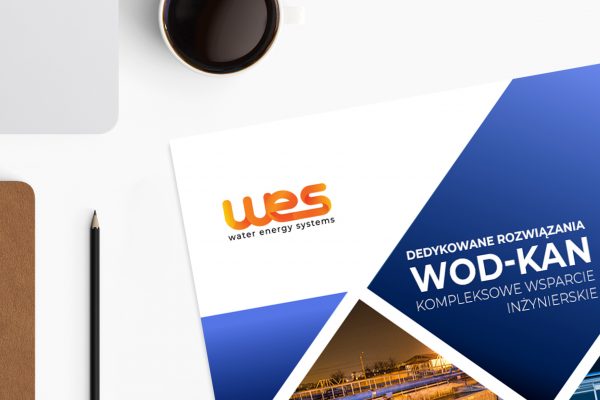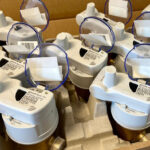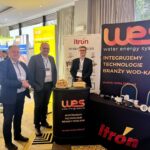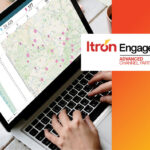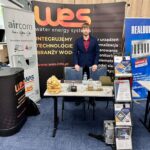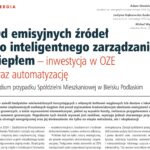a new series of webinars by “POLISH WATERWORKS” Chamber of Commerce is underway – most modules are led by experts from WES Sp. z o.o.
The series is addressed to management staff and technical employees of small water and sewage companies.
WEBINARS COMPLETED
- Small water and sewage company operation improvement plan / January – by Piotr Tuz, WES Sp. z o. o.
- Selection of water meters / February – by Tomasz Cichoń, Krakow City Waterworks
- Measurement data acquisition / March – by Piotr Tuz, Tomasz Kasjański, Marcin Szczurowicz, WES Sp. z o.o.
- GIS / April – by Łukasz Wysocki, Artur Zajkowski, WES Sp. z o.o.
UPCOMING WEBINARS:
- Network model / May – by Łukasz Wysocki, Artur Zajkowski, WES Sp. z o.o.
- Leak detection / September – by Piotr Tuz, Łukasz Wysocki, WES Sp. z o.o.
- Summary of the first edition of the cycle – a specific action plan using knowledge from all modules / October – by Piotr Tuz, WES Sp. z o.o.
WHAT DID WE DISCUSS IN PAST TRAININGS?
MODULE 1. A PLAN FOR IMPROVING THE OPERATIONS OF A SMALL WATER AND SEWAGE ENTERPRISE
Program
- The specifics of a small water and sewage company
- The most common pains, dilemmas and challenges
- A multi-faceted program – what awaits us in the entire cycle?
- Why is this order of stages important?
- Where to get the money for all this?
- Others have already been through this – examples of good practices of small water and sewage companies
TRAINER
 Piotr Tuz PhD Eng.
Piotr Tuz PhD Eng.
Long-time researcher at the Białystok University of Technology. Specialist in the field of water and sewage management, metrology of measuring devices, flow and pressure measurement in water and sewage installations and networks. Advisor to water supply companies and property managers in the field of reducing water losses. Author of studies on metrological devices in numerous water supply companies.
He developed his own concepts – reducing the balance difference in multi-family buildings and multi-aspect reduction of water losses in water and sewage companies. Speaker at conferences and trainings in the field of water balancing and water meter management. Author of numerous scientific publications and studies for water supply companies – including optimization and guidelines for the selection of water meters or the concept of water supply network management.
Member of the board and Sales Director at WES Sp. z o.o.
Module 3. Measurement data acquisition
Program
1. Introduction
9 steps to optimize enterprise management in water and sewage aspects – a reminder of what stage of the cycle we are at?
2. Measurement data obtained from water meters
- water meter reading systems – evolution
- water meter reading systems – current status, types, system parts, devices
- nomenclature in water meter reading
- measurement data in the aspect of the NIS2 directive and GDPR
- examples and calculations, profitability
- systems to which data from water meters are transferred
3. Measurement data obtained from water flow meters
- types of data
- systems to which data from water flow meters are transferred
4. Measurement data obtained from sewage flow meters
- types of data
- systems to which data from sewage flow meters are transferred
trainers

Piotr Tuz PhD Eng. – Long-time researcher at the Białystok University of Technology. Specialist in the field of water and sewage management, metrology of measuring devices, flow and pressure measurement in water and sewage installations and networks. Advisor to water supply companies and property managers in the field of reducing water losses. Author of studies on metrological devices in numerous water supply companies.
He developed his own concepts – reducing the balance difference in multi-family buildings and multi-aspect reduction of water losses in water and sewage companies. Speaker at conferences and trainings in the field of water balancing and water meter management. Author of numerous scientific publications and studies for water supply companies – including optimization and guidelines for the selection of water meters or the concept of water supply network management.
Member of the board and Sales Director at WES Sp. z o.o.

Tomasz Kasjański – Remote reading systems specialist with over 30 years of experience in radio communication technologies, wave propagation, signal emission, configuration and operation of wireless solutions. Currently responsible for the implementation and integration of remote water meter reading systems in water supply companies.
Remote reading systems specialist at WES Sp. z o.o.

Marcin Szczurowicz –Graduate of the Wrocław University of Science and Technology, Faculty of Environmental Engineering. Associated with the water industry for 30 years through work in companies producing media measurement devices and remote reading systems. Actively participated in the construction of various models of water and heat meters and structures of various reading systems. Currently responsible for sales and implementations in the area of telemetry and SmartCity IoT in water supply companies.
Deputy Sales Director at WES Sp. z o.o.
Module 4. gis
 Program
Program
- 9 steps to optimize enterprise management in water and sewage aspects – a reminder of where we are?
- Introduction: What is GIS and why is it worth implementing?
- From paper map to GIS – the evolution of spatial data management
- Typical network management problems without GIS
- Types of spatial data
- Free spatial data resources in Poland
- Scheme of GIS implementation in a small enterprise. Can an open-source tool be used for this purpose?
- Stationary GIS in the office and a mobile application in the field – key functionalities
- Examples of GIS implementations in water and sewage enterprises

trainers

Łukasz Wysocki
Network Modeling Department Manager at WES Sp. z o.o.

Artur Zajkowski
Network Modeling Specialist at WES Sp. z o.o.
Graduates of the Białystok University of Technology in the field of Environmental Engineering. PhD students at the Doctoral School of the Białystok University of Technology. They have many years of professional experience in hydraulic network modeling and GIS implementation for water supply companies throughout Poland. They also specialize in monitoring water and sewage networks, network management concepts and designating DMA and PMA zones. They conduct training in hydraulic network modeling for water supply companies. Participants in numerous training courses in network modeling and GIS software from various manufacturers. Authors of scientific publications in the area of network modeling. Passionate about modern technologies and innovations in environmental engineering.
Archival material – Artur Zajkowski was part of our team from 2020 to 2025. He is no longer professionally associated with WES Sp. z o.o., but we are proud to present our joint projects from that period.
Why are we focusing on small water and sewage companies in this edition?
- Different organizational challenges
Small water and sewage companies have specific needs and challenges that differ from the problems of large plants. They often lack extensive organizational structures and financial resources, which requires greater flexibility and multitasking from managers.
- Limited human and financial resources
In small waterworks, one person is often responsible for many areas of activity – from financial management, through investments, to technical supervision. That is why our training includes simple, effective solutions that can be implemented without large financial and personnel outlays.
- The specifics of serving smaller communities
Small water and sewage companies often serve small towns or communes, which requires a special approach to managing relationships with residents. Building trust in the local community and quickly responding to failures and problems is crucial to maintaining high quality of services.
- The need to meet the same requirements as large companies
Despite their scale, small waterworks must meet the same rigorous legal and environmental standards as large plants. This requires them to effectively manage and optimize costs.
- Lack of access to specialist solutions
Large companies can benefit from modern technologies, management systems and expert support. In the case of small companies, access to such resources is limited, which is why our training emphasizes practical methods that can be implemented even with a low budget.
REGISTRATION AND PARTICIPATION COSTS
on the website of the Organizer – the “Polish Waterworks” Chamber of Commerce

 European Union
European Union




